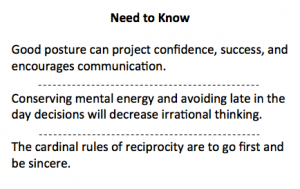What do your Mother, a Car Salesman and a Hare Krishna devotee have in Common
November 20, 2015 ~ Written by: W.B. “Bud” Kirchner
 Answer: They all know more about aspects of the Business Brain Model than you do!
Answer: They all know more about aspects of the Business Brain Model than you do!
Is this possible given your years in business and/or your higher education? Simply put – yes.
“It takes considerable knowledge just to realize the extent of your own ignorance.” ~ Thomas Sowell
Let’s look at the facts:
Your Mother
“Men are what their mothers made them.” ~ Ralph Waldo Emerson
Who amongst us has not been told, “Stand up tall,” or “Don’t slouch” (in a maternal voice)? Are they striving for the pride of having the tallest child? Or do they (as always) know more than their children? I have, of course, hinted at what is actually going on in previous articles titled “It’s Not What You Say, It’s How You Show It,” and “Did You Know You Have Two Brains?”
In fact, thanks to research from Amy Cuddy (Harvard University), Dana Carney and Andy Yap (both of Columbia University) titled “Power Posing: Brief Nonverbal Displays Affect Neuroendocrine Levels and Risk Tolerance,” we know that “high-power posers, experienced elevations in testosterone (20%), decreases in cortisol (25%) and increased feelings of power and tolerance for risk.”
In a business context, this leads to more confidence and a sense of being in charge – or in other words: enhanced likelihood of success beyond ones title or position.
Of course, this is a double winner – expansive posture can not only project the above internal feelings to those around you but it can create an ‘inviting’ physical space to encourage communication and relationship building.
“Life cannot subsist in society but by reciprocal concessions.” ~ Samuel Johnson
So think about your mother and stand straight with your hands on your hips (like Superwoman) or if seated, put your hands behind your head or lean forward with your hands on the table, but in any event “Don’t slouch!”
Car Salesman
“For must of us, though, the problem is not a lack of goals but rather too many of them.” ~ Roy F. Baumeister
Do you think car salesmen sit around and discuss “decision fatigue?” Incidentally, for the Freudians in the crowd, Baumeister, who co-authored “Ego Depletion: Is the Active Self a Limited Resource?” has termed this as “ego depletion.” So maybe this is how salesmen think about it?
is how salesmen think about it?
In any event, they know (instinctive?) how to capitalize on “analysis paralysis.” They know (I assume empirically) that as your brain struggles to conserve energy (remember brain stats from my article “Arming Yourself in the Battle with Your Mind:” 2 percent of your body weight but 20 percent of your energy consumption) it will fatigue after decisions on mundane things like floor mats, colors and trim. Then (and only then) they will hit you with the big ticket decisions – carefully constructed so that the default decision costs more – and by definition earns them more.
Clearly, a bad decision (for you) but inevitable since we have a finite amount of energy for decision-making.
This phenomenon usually leads to irrational decision making which is manifested by the two extremes of impulsivity or lack of action!
In a business context – the message here is to avoid back-to-back meetings, late in the day decisions and multiple sequenced decisions. In other words: conserve mental energy. Certainly a theme we will touch on again in the next section.
Given we can’t always control the time of the meeting; the obvious anecdote when it comes to energy is food. Obvious, but John Tierney’s New York Times Magazine article, “Do You Suffer From Decision Fatigue?” reported on some interesting research: “Your brain does not stop working when glucose is low. It stops doing some things and starts doing others. It responds more strongly to immediate rewards and pays less attention to long-term prospects.” How scary is this when it comes to business decisions?!
Hare Krishna
The teachings of Eastern philosophies are often a mystery – especially to westerners. Having said that I have over the years read a lot on Eastern philosophies and in my readings I have never come across reciprocity as a strategy.
Admittedly, there is a lot written on compassion and empathy (see my articles “Lessons Learned from Street People” and “Einfühlung”) in their purest forms.
So – when the Hare Krishna person approaches you chanting a mantra they will (unlike many ‘solicitations’) give you a flower or a verse that you will feel (subconsciously) inclined to reciprocate – as in “make a donation.” We know from the world of neuroscience/psychology that our instinctive tendency when someone gives us a gift is to return the gesture. An act so important that it is sometimes called the law of reciprocity.
Given most business people don’t ‘go begging’ (although there are days in the life of an entrepreneur…), what about the simple gesture of serving a colleague a cup of coffee? Surely that couldn’t influence their desire to reciprocate (cooperate) could it?
As always – I offer you some hard science to support my points. Feel free to check out “Neural Correlate of Human Reciprocity in Social Interactions,” by Shiro Sakaiya, Yuki Shiraito, Junko Kato, Hiroko Ide, Kensuke Okada, KoujiTakano and Kenji Kansaku published in Frontiers in Neuroscience on December 17, 2013.
In short, their work illustrates the left amygdala, the right middle dorsolateral prefrontal cortex and dorsal caudate, as well as the ventromedial prefrontal cortex (VMPFC and precuneus) are involved in reciprocity. They found “the intensity of emotion attached to human reciprocity was represented in the amygdala, whereas insight into the reciprocity of others was reflected in activation across the reward-related and ToM (theory of mind) regions.” In other words, multiple sections of your brain are all engaged and driving you to “return the favor.”
Surely, this much (brain) horsepower being involved validates the importance of reciprocity!
Incidentally, the cardinal rules regarding reciprocity are:
- Go first.
- Be sincere.
Thus illustrates the human aspect – you are building trust and rapport.
Back to the earlier theme, in the context of saving energy, reciprocity acts as a shortcut to decision making. You can imagine the relevance to business processes such as negotiations.
Relevance
So – what is the point of this article? Surely, I don’t want to feed the inherent (necessary) insecurity of business builders and managers. Nor do I propose Kirchner Group will start recruiting only mothers, Hare Krishna devotees and car salesmen for our management positions. (Although, I wouldn’t rule them out.)
Rather, I simply wanted to reinforce a couple premises of the Business Brain Model:
(1.) There are varied things we know from the world of neuroscience/psychology that business ignores and
(2.) they can have real (business) world benefits if you use them.
“Life cannot subsist in society but by reciprocal concessions.” ~ Samuel Johnson
About the Author: W.B. “Bud” Kirchner is a serial entrepreneur and philanthropist with more than 50 years of business success. He is not a scientist or an academic but he does have a diversified exposure to neuroscience, psychology and related cognitive sciences. Generally speaking, the ideas he expresses here are business-angled expansions of other people’s ideas, so when possible, he will link to the original reference.
